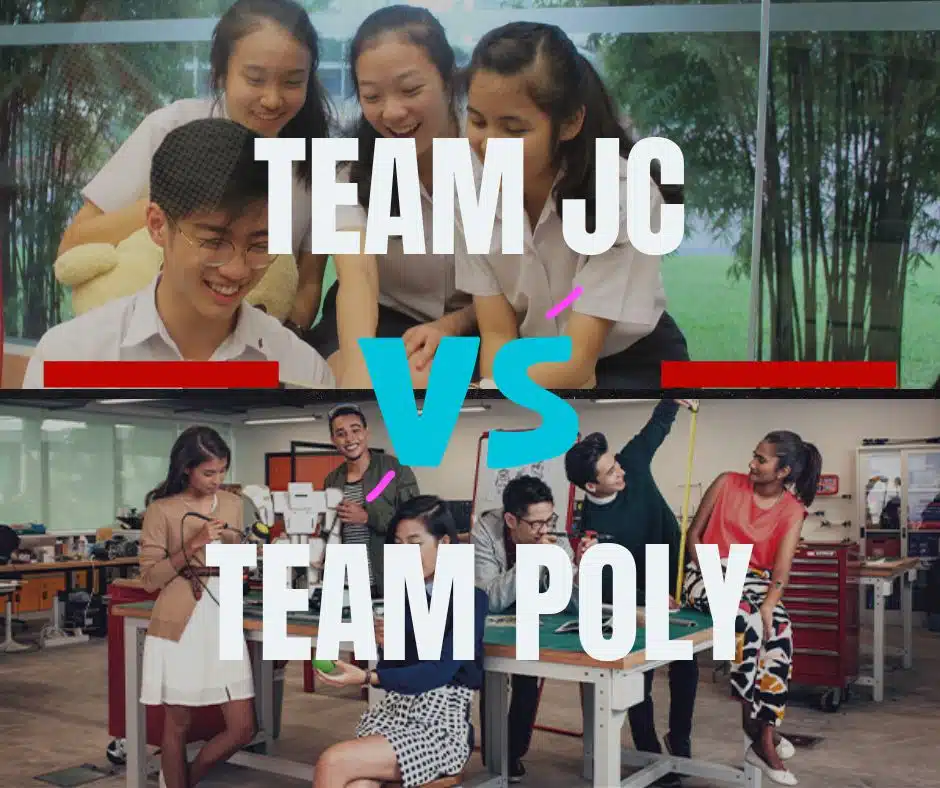
After finishing their ‘N’ or ‘O’ Levels, students are faced with the decision of choosing between Junior College (JC) and Polytechnic (Poly) to chart their path towards future career goals. If you find yourself contemplating the JC vs Poly dilemma in Singapore, this blog aims to offer insights into both routes. Let’s delve into the details to assist you in making an informed decision.
Table of Contents
The Evolving Landscape
Gone are the days when JC was hailed as the superior choice. Both Junior College and Polytechnics offer unique opportunities, focusing on academic learning through different lenses.
If you’re exploring educational pathways in Singapore, you might also be interested in optimizing your student life financially. Check out this comprehensive guide on saving money in Singapore for valuable tips and insights. Managing your budget effectively can enhance your overall student experience.
Junior College Route
Duration and Academic Structure
Embarking on Junior College (JC) is akin to undertaking a demanding two-year sprint culminating in the ‘A’ levels examination. Dubbed as one of the most challenging academic experiences, JC life is characterized by fixed timetables and rigorous A Levels preparation.

In this journey of academic excellence, students often seek additional support to excel in subjects like Math. Fortunately, resources like math olympiad training programs can provide the necessary guidance and enrichment to navigate the complexities of mathematical concepts. These specialized programs not only enhance subject proficiency but also foster critical thinking and problem-solving skills essential for success in competitive examinations.
As students immerse themselves in the academic rigors of Junior College, they also lay the groundwork for future endeavors. The disciplined environment, coupled with intensive subject disciplines, acts as a crucible for personal and intellectual growth, preparing students for the challenges of university life and beyond.
Curriculum
In JC, you pick a stream – Science or Arts. The subjects you choose now shape your future academic battleground.
Science Stream Example:
- Math (H2)
- Chemistry (H2)
- Physics/Biology (H2)
- One Humanities (H1)
- General Paper (H1)
- Project Work (H1)
Arts Stream Example:
- Economics (H2)
- Geography/History (H2)
- Literature (H2)
- Math (H1)
- General Paper (H1)
- Project Work (H1)
In the Junior College landscape, the grading system holds paramount significance, with each H2 (Higher 2) subject carrying a weight of 20 rank points and each H1 (Higher 1) subject contributing 10 rank points. The cumulative rank point, calculated out of a maximum of 90, serves as the yardstick for local university admissions.
Points Breakdown:
- H2 Subjects: ‘A’ (20 points), ‘B’ (17.5 points), ‘C’ (15 points)
- H1 Subjects: ‘A’ (10 points), ‘B’ (8.75 points), ‘C’ (7.5 points)
For those eyeing entry into local universities, the magic number often hovers around 70 rank points. However, the more prestigious courses, such as computing, medicine, and law, set the bar higher, demanding 85 to the full 90 rank points for admission.
Choosing your academic stream wisely involves thinking ahead and considering the university course you plan to pursue. Some courses may have specific entry requirements or offer exemptions for introductory modules if you perform well in your ‘A’ levels.
For those interested in engineering and science-related courses at university, opting for the science stream is a solid choice. On the flip side, if you’re eyeing more humanities-oriented courses like psychology or social science, the arts stream is likely the better fit for you.
Discipline and Regulation
Junior College (JC) maintains a structured environment akin to an upgraded version of secondary school. The institution upholds disciplined rules to foster a focused learning atmosphere. Students adhere to fixed reporting times, reinforcing punctuality and time management skills. The enforcement of a school uniform symbolizes unity and equality among students, emphasizing a collective academic journey.

In essence, JC’s discipline and regulations are almost exactly the same as your past 4 years in a secondary school. This means neat black hair, no external accessories, morning assemblies. The plus side is that you get to wear any sneakers you like as opposed to the usual white sneakers back in secondary school days.
University Admission Criteria
Around 70% of JC cohorts manage to snag university spots, with the majority relying on their A Level results as the golden ticket.
Now, the key to this university gateway lies in the Rank Points system. Think of it as a scorecard out of 90 points. If you drop a grade in an H2 subject, you lose 2.5 points. For H1 subjects, it’s a 1.25-point deduction. So, acing those core subjects like AAB/B translates to a sweet spot of 86.25 rank points.
Why do JC graduates often breeze into university? Well, it’s like they’ve been training in the academic Olympics. The structured and intense nature of JC prepares them for the hurdles of university coursework. So, when you hear that JC is a stepping stone to university, it’s not just a saying – it’s a proven path for the majority to make it into the university arena.
Pros & Cons of JC
Pros:
– Shorter duration (2 Years)
– Flexible subject combination
– Standard student life similar to ‘O’ levels
– Around 70% of ‘A’ levels holder go on to local university
– Good for people who do not want to branch out that quickly
Cons:
– Heavier academic workload
– Very structured school timetable
– Retaining is very common
Polytechnic Route
Duration and Academic Structure
Polytechnic (Poly) emerges as a dynamic alternative to the traditional Junior College (JC) route, offering a unique blend of practical learning and academic depth. The Poly journey extends over three years, providing a more extensive timeframe for students to delve into their chosen field of study. Unlike the sprint-like intensity of JC, Poly operates more like a marathon, allowing for a more comprehensive exploration of subjects.

Polytechnic life stands out for its project-based approach, emphasising practical skills and real-world applications. The timetable is often more flexible, with some students enjoying days without lessons. This flexibility grants more leisure time, fostering a balanced lifestyle. Poly’s diverse curriculum nurtures a range of life skills and developmental competencies, preparing students for the workforce. There are also Internship opportunities available during course of study as part of the academics which generally ranges for about 3 to 6 months
Curriculum
Polytechnics offer a broad array of courses catering to various interests and career paths. Unlike the specialised streams in JC, Poly students have the flexibility to choose from an extensive range of modules relevant to their chosen course. This allows for a more tailored and hands-on learning experience. Some common courses are Electrical Engineering, Business Studies, Mass Communications and Psychology.
The grading system in Polytechnics revolves around the Grade Point Average (GPA), an accumulation of results across all semesters. The emphasis on continual assessment ensures a consistent academic performance throughout the three-year journey. While there’s no uniform rank point system like in JC, a strong GPA remains pivotal for various opportunities, including university admissions and job placements.

Choosing your course in Poly involves committing to a specific field of study early on, making it essential to have a clear understanding of your interests and career goals. Polytechnic courses are designed to equip students with practical skills and knowledge directly applicable to their chosen industry.

Discipline & Regulation
Polytechnic life is characterised by a more relaxed atmosphere compared to JC. The dress code is less stringent, allowing for personal wardrobe choices and varied hairstyles – this means you can go crazy with your appearance, it’s not unusual to see students with blonde hair walking up the famous Ngee Ann Polytechnic slope as if it’s a fashion walkway.

The absence of fixed reporting times provides a more flexible schedule, promoting a sense of independence and responsibility. However, most Polytechnics enforce a percentage-based attendance system, ensuring students engage actively in their coursework.
Polytechnics embrace diversity and personal expression. This environment fosters a sense of individuality and creativity, allowing students to focus on their academic pursuits while enjoying a relaxed and inclusive campus culture. It’s environment is almost exactly like a university.
University Admission Criteria
Approximately 20% of Polytechnic cohorts make their way to local universities, showcasing a growing trend of Poly graduates securing university spots. The path to university for Poly students follows a different trajectory than JC, as they often enter the workforce directly after completing their diploma.
University admission for Poly graduates hinges on the cumulative GPA achieved during their Polytechnic journey. Different courses and modules contribute varying credit units to the GPA, making consistent academic performance crucial. Some Polytechnic courses may also offer exemptions or a head start in specific university programs, providing an added advantage.
Pros & Cons of Poly
Pros:
- University-Like Environment
- No Uniforms
- Internship Opportunities
- Emphasis on Project Work
- Variety of Courses
- More Free Time
Cons:
- Top 20% of Poly Cohort Enters Local Universities
- 3-Year Timeline
- GPA Maintenance
- ‘Hell Week’ with Assignment Deadlines
Making the Decision: JC vs Poly
Choosing the Polytechnic Route
Choosing the Polytechnic route was like unlocking a whole new level in my education journey. It wasn’t just about books and exams; it was about getting my hands dirty and learning by doing. This decision turned out to be way more exciting and eye-opening than I expected.
Polytechnic education is like a practical crash course for the real world. The three-year timeline allowed me to really get into the nitty-gritty of my chosen field. It’s not a sprint like Junior College; it’s more like a marathon, giving you the time to soak in the practical knowledge.
What stood out the most for me was the project work. It’s not just about hitting the books; it’s about working with a bunch of different people, each with their own quirks. Some were super helpful and smart, while others were, let’s say, a bit challenging to work with. It’s like a sneak peek into what a real job might be like – you get the good, the tough, and everything in between. Personally, I’ve even started likening these personalities in project work to game characters, such as “The Tank,” “The Hard Carry,” and “The Skiver.” Reflecting on my experience as a working adult now, it truly mirrors the complexities of the real world.
For me, Polytechnic wasn’t just a stepping stone to a university; it was a complete package. It set me up with skills I can actually use in the working world. I made it into Business at Nanyang Technological University after I completed poly. Even if the university door didn’t swing open, I felt ready and capable to start my career journey. It’s not just about learning; it’s about gearing up for the real deal.
Lastly, let’s clear the air – heading to a polytechnic doesn’t mean closing the door to local universities. The trend is shifting, with 1 in 3 university admissions being a poly graduate.
Choosing the Junior College Route
For those of us grappling with the labyrinth of career choices, the Junior College (JC) route often becomes a haven, offering a sanctuary to navigate the uncertain waters of the future. I’ve seen friends, much like myself, drawn to JC because it provides a crucial two-year hiatus—a breathing space to untangle the complexities of career decisions. It’s a bit like hitting the pause button on the rush towards adulthood.
In the academic realm, JC becomes a shortcut to the coveted university experience, a sprint rather than the marathon of Polytechnic life. Some of my closest friends chose this path, driven by a desire to fast-track their journey to university within the confines of a condensed timeline. I’ve witnessed their aspirations take shape as they focused on the intensity of JC’s academic rigours.
Yet, there’s another layer to this choice that often goes unspoken—the apprehension of growing up too quickly. I didn’t tread the JC route, but in the narratives of my friends, I discerned a common theme—they were reluctant to embrace the unforgiving independence that Polytechnics thrust upon their students. JC, with its structured environment, seemed like a gentler introduction to the adult world.
So, for those who find comfort in the grace period JC affords, allowing for introspection and a gradual transition, this route becomes more than an academic choice; it’s a personal strategy to navigate the uncertainties of the future at a pace that feels right.
Conclusion
In conclusion, the choice between Junior College (JC) and Polytechnic (Poly) is a pivotal decision that shapes your educational journey and future career path. JC offers a sprint-like, intense two-year program that culminates in the ‘A’ levels examination, providing a stepping stone to university for those who excel in academics. The disciplined and structured environment of JC mirrors an upgraded version of secondary school, preparing students for the academic rigors of university life.
On the other hand, Polytechnic unfolds over three years with a more hands-on, project-based approach that emphasizes practical skills and real-world experience. The flexibility of schedules and diverse course offerings cater to varied learning styles, allowing students to delve deeper into their chosen fields. I, for one, found the Poly route incredibly rewarding, providing a robust foundation for real work experience and instilling independence.
Whether you opt for the sprint of JC or the marathon of Poly, both paths have their unique advantages and challenges. Your decision should align with your learning style, career aspirations, and personal preferences. Remember, it’s not just about where you start but how well you navigate the journey and leverage the opportunities presented. Ultimately, the JC vs Poly dilemma is a significant crossroad, and your choice will set the stage for the exciting chapters that lie ahead.
Frequently Asked Questions
What is the difference between poly and JC in 2023?
In 2023, the distinction between Junior College (JC) and Polytechnic (Poly) in Singapore remains rooted in their educational structures. JC offers a condensed, two-year program, emphasizing academic intensity and culminating in the ‘A’ levels examination. In contrast, Poly unfolds over three years, incorporating a project-based approach with a focus on practical skills and real-world applications. Choosing between them involves considering your learning style, career goals, and personal preferences. In fact, over the years we are seeing an uptrend of students choosing to go the poly route.
Why is Singapore Polytechnic a good choice?
Singapore Polytechnic (Poly) is recognized for its dynamic approach to education, offering a diverse range of courses that cater to various interests and career paths. The three-year timeline allows for a more comprehensive exploration of subjects, emphasizing practical skills and hands-on learning. Polytechnics, including Singapore Polytechnic, nurture a balanced lifestyle with flexible schedules, project-based learning, and opportunities for internships, providing students with a holistic educational experience.
What percentage of JC students go to university in Singapore?
Approximately 70% of Junior College (JC) cohorts manage to secure spots in local universities in Singapore. The structured and intense nature of JC, including its focus on the ‘A’ levels examination, prepares students for the academic rigors of university coursework. The majority of JC graduates rely on their ‘A’ Level results as the key to securing a place in a university.
Is it hard to get into university from poly?
While the path to university from Polytechnic (Poly) is different from JC, there’s a growing trend of Poly graduates securing university spots. The admission for Poly graduates is based on their cumulative Grade Point Average (GPA) achieved during their Polytechnic journey. The top 20% of Poly cohorts typically enter local universities. It’s essential to maintain a strong GPA, and some Polytechnic courses may offer exemptions or advantages in specific university programs, providing additional opportunities for Poly graduates to pursue higher education.



Leave a Reply